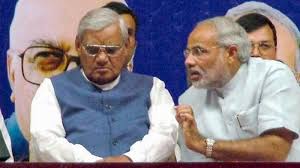
On the 100th birth anniversary of former Prime Minister Atal Bihari Vajpayee, Prime Minister Narendra Modi penned an article paying tribute to the BJP stalwart, highlighting his transformative contributions to India’s progress. In the piece, published across several newspapers, Modi called Vajpayee the “architect of India’s transition into the 21st century,” emphasizing his pivotal role in shaping the country’s economic surge.
Prime Minister Modi reminisced about Vajpayee’s long political career, noting that despite facing immense opposition, he never allowed bitterness to cloud his judgment. Vajpayee, Modi remarked, stood as an enduring figure of statesmanship and continued to inspire generations.
A Leader Who Chose Ideology Over Power
Modi also reflected on the leadership style of Atal Bihari Vajpayee, particularly his principled stand on politics. He noted that Vajpayee consistently chose ideology over opportunistic power politics. Modi highlighted how, in 1996, Vajpayee chose to resign rather than resort to horse-trading to retain power. In 1999, after his government was defeated by a single vote, Vajpayee upheld the integrity of the democratic process, refusing to challenge the outcome, and later returned to power with a resounding mandate.
“He was not one to cling to power through opportunistic means,” Modi wrote, praising Vajpayee for his adherence to ethical political practices, which set a remarkable example for leadership.
Legacy of Courageous Leadership
PM Modi also recalled the monumental decision taken by Vajpayee’s government in 1998 to conduct the Pokhran nuclear tests, codenamed ‘Operation Shakti,’ which Modi regarded as an exemplary demonstration of leadership and resolve. Despite facing global criticism and sanctions, Vajpayee’s government stood firm, emphasizing India’s sovereignty while advocating for world peace. Modi lauded Vajpayee for not buckling under international pressure, which marked a significant turning point in India’s global standing.
“Any ordinary leader would have buckled,” Modi wrote. “But Atal Ji was made differently.”
Commitment to the Constitution and Nation Building
The Prime Minister also underscored Vajpayee’s deep commitment to safeguarding the Constitution, particularly his role in the anti-Emergency movement in the 1970s and his decision to merge his own Janata Party with the Janata Alliance in 1977. Vajpayee, Modi noted, prioritized the nation’s democracy and constitutional values above personal political gain.
Modi further highlighted the advancements made under Vajpayee’s leadership, particularly in technology and infrastructure. He praised the NDA government’s efforts to make technology more accessible and impactful for citizens, such as the Golden Quadrilateral project, which connected India’s key cities. Vajpayee’s government, according to Modi, also made significant strides in the telecom and information technology sectors, laying the foundation for the country’s modern infrastructure.
Additionally, Modi lauded initiatives like the Pradhan Mantri Gram Sadak Yojana, which expanded road connectivity in rural areas, and the ambitious push for metro connectivity, most notably through the Delhi Metro, a world-class infrastructure project that stands as a symbol of Vajpayee’s foresight.
A Leader Who Remains an Inspiration
Prime Minister Modi concluded his tribute by calling Vajpayee an icon whose leadership continues to resonate in India’s growth story. His article serves as a reminder of the values and principles that guided Vajpayee throughout his life and career, inspiring future generations to uphold the ideals of governance, unity, and nation-building that he championed.
As India marks this significant milestone, PM Modi’s reflections on Vajpayee’s life and leadership offer a profound tribute to a leader whose legacy has indelibly shaped the nation.
Sources By Agencies




